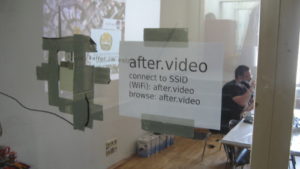after.video will be presented during the indefinite vision
symposium @ whitechappel art gallery, see:
http://www.whitechapelgallery.org/events/indefinite-visions/ (before the
symposium during a workshop on methodologies – see schedule below ->
after.video is in the 4-5.30pm slot)
WORKSHOP: THE AUDIOVISUAL ESSAY WHITECHAPEL GALLERY, LONDON
WEDNESDAY 22nd JUNE
11.30am-1pm. Forms
Themes:
Audiovisual essay forms (close analysis, artistic/poetic montage,
supercut/thematic montage, ‘interstitial’).
Techniques: temporal manipulation, overlays, split-screen, voice-over
Audiovisual essays as supplements to written scholarship and as core
methodology.
Questions:
What types of scholarship are audiovisual essays suited (and not suited) to?
What more could audiovisual essay achieve critically and aesthetically?
11.30-11.45. Presentation: Kevin B. Lee on the current state of the art
11.45-12. Presentation: TBC
12-12.30. Break-out discussions
12.30-1. Group discussion
1pm-2pm. Lunch
2pm-3.30pm. Contexts
Themes:
Role within film journalism, as a critical tool
Role within teaching, as a heuristic tool
Relationship with film-making (‘theory’ vs ‘practice’)
Relationship with artists’ film and video
Questions
How to further incorporate audiovisual essays into mainstream scholarship
via academic legitimation (e.g. increasing publishing opportunities)?
via refinement of the form and its methodologies?
via databasing?
How does the audiovisual essay fit within current copyright law in the
UK and beyond?
Do different distribution models (e.g. peer-reviewed, ‘self-published’,
programmed by cultural gatekeepers) suit different kinds of audiovisual
work?
2.30-2.45. Presentation: Catherine Grant on videographic film studies
and academic publishing
2.45-3. Presentation: David Rodowick on negotiating film theory and film
practice
3-3.30. Break-out discussions
3.30-4. Group discussion
3.30pm-4.00pm. Break
4.00pm-5.30pm. Methodologies
Themes
Terminology (video essay, audiovisual essay, videographic film studies,
digital film studies)
Alternative technologies and methodologies:
Quantitative:
data analysis (e.g. cinemetrics, ECGs and eye tracking)
visualisation – e.g. Volumetric Cinema, Software Studies Initiative
Qualitative:
Annotation (e.g. Popcorn.js, ANVIL, Lignes de Temps)
Creative:
Critical media art (e.g. after.video)
Interactive documentary
Questions
How can audiovisual essay production be connected to adjacent, less
prevalent, digital humanities activities?
What can be learnt from the use of digital technologies in other
humanities disciplines?
What models of collaboration could help audiovisual film scholarship
develop in scope, complexity, and impact?
4.30-4.45. Presentation: David Verdeure on adjacent methodologies
4.45-5. Presentation: Richard Misek on adjacent technologies
5-5.30. Break-out discussions (open)
5.30-6. Group discussion
Viewable during breaks:
Don’t Look Now: paradoxes of suture (interactive video on Mac laptop)
After.Video Assemblages (videos on Raspberry Pi)
Notes on Blindness: Into Darkness (VR experience, at Close Up Film Centre)

